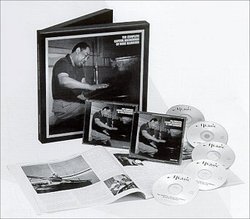| All Artists: Duke Ellington Title: The Complete Capitol Recordings Members Wishing: 2 Total Copies: 0 Label: Blue Note Records Original Release Date: 1/1/1955 Re-Release Date: 3/23/1999 Album Type: Box set Genres: Jazz, Pop Style: Swing Jazz Number of Discs: 5 SwapaCD Credits: 5 UPC: 724349936225 |
Search - Duke Ellington :: The Complete Capitol Recordings
 | Duke Ellington The Complete Capitol Recordings Genres: Jazz, Pop Historians and some Duke Ellington fans look askance at the brief period he spent on Capitol Records (1953-55). This was a hectic period in jazz, with bebop in the near-view, hard bop coming along as well, and the big band... more » |
Larger Image |
CD Details
Synopsis
Amazon.com
Historians and some Duke Ellington fans look askance at the brief period he spent on Capitol Records (1953-55). This was a hectic period in jazz, with bebop in the near-view, hard bop coming along as well, and the big band was considered by many to be a relic of bygone eras. Yet Ellington persevered, and not without another adversity: the temporary loss of signature alto player Johnny Hodges, who was off leading his own bands. The resulting five CDs worth of material collected here show an Ellington band more aimed at repetition, both of its own repertoire, which had sounded better in the 1940s, and of other bands' material. Singer Jimmy Grissom does a good job with the Ellington band, without the velvety, almost spooky polish of Herb Jeffries (as evidenced on the astounding Blanton-Webster Years collection) but with a sureness that even sounds like jump blues in spots. What comes from the full-band tracks here is a clear demonstration that Ellington's outfit was sharp in the early '50s, with Juan Tizol and Ray Nance playing at a peak. But what's invaluable from this box set are the Ellington small-band tunes. The piano-trio cuts, available separately on Piano Reflections, present Duke as a keyboard polymath, dropping modernist touches in his spacing and phrasing and still managing a great deal of coloristic depth. And then there are the totally startling long blues tunes with Ellington on electric piano. Preeminently interested in everything that seemed musically possible, Ellington makes the tunes shine. This collection serves as a long-form rebuttal to all the naysayers who scoff at the Duke's early 1950s work. --Andrew Bartlett
